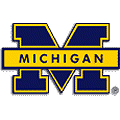
Another Michigan goaltending recruit has decided to leave the CCHA school without ever suiting up for the Wolverines.
John Gibson, who signed a letter of intent to attend U-M this fall after backstopping the U.S. National Development Team, will instead join the OHL's Kitchener Rangers after being drafted 39th overall by the Anaheim Ducks in the 2011 NHL Entry Draft. Gibson follows former NTDP netminder Jack Campbell, who also committed to Michigan, got drafted in the first round by the Dallas Stars last year, and then jumped to the OHL's Windsor Spitfires without ever making a start at Yost Arena.
http://www.annarbor.com/sports/john-gibson-de-commits-from-michigan-hockey-team-will-turn-pro/
Michigan has long been a top program that has seen more than its share of players jump early to the professional ranks. Now those players are not even bothering to enroll in school, much less play in any college games. At least Shawn Hunwick is coming back to Ann Arbor for his fifth year after backing the Wolverines to within an overtime tally of a national title in April.
It's the same old adage of major junior plays more games and will get you to the pros faster. Well, you get to play more games, but doing well in juniors is no guarantee that you'll be ever be a star in the NHL itself - especially for goaltenders, since there are so few positions to go around at the top level. Martin Brodeur may be in the twilight of his career in New Jersey; but Jonas Hiller is still going strong in Anaheim, and Kari Lehtonen isn't looking to leave Dallas any time soon after escaping Atlanta. Not only would Gibson and Campbell have to shine in the OHL, they'd have to play well enough to supplant two veteran NHL netminders - easier said than done, especially if they have to apprentice in the minors first.
There are simply no guarantees when it comes to the NHL, no matter how highly you are drafted. I saw Jason Bacashihua win 20 games for the NAHL's Chicago Freeze in 1999-2000, then go to the OHL's Plymouth Whalers after not being eligible to play at Michigan. He won 26 games for the Whalers in 2000-01, then was drafted 26th overall by Dallas. He went to the AHL the next season and a decade later has played grand total of 38 NHL games, all with the St. Louis Blues, and none since 2006-07.
College hockey itself is no guarantee of NHL stardom - Scott Clemmensen won 99 career games and a national title in 2001 with Boston College. Since then he's appeared in 122 NHL contests with New Jersey, Toronto and Florida - granted, he was stuck as Martin Brodeur's backup with the Devils and never really got a chance to play until 2008-09. Brodeur was injured that year and missed most of the campaign, while Clemmensen went on to win 25 games before later going to the Panthers. That's about as big as it's gotten for him in his NHL career - quite serviceable, but admittedly nowhere near superstardom.
Gibson and Campbell may have been drafted higher than Clemmensen, but there's absolutely no guarantee they'll have it any better when they're ready to move on to the next level, which may or may not include the NHL itself.



